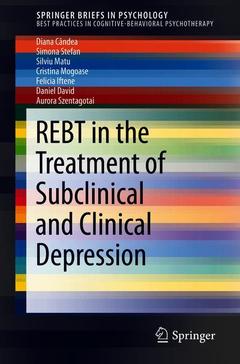Description
REBT in the Treatment of Subclinical and Clinical Depression, 1st ed. 2018
Best Practices in Cognitive-Behavioral Psychotherapy Series
Authors: Cândea Diana, Stefan Simona, Matu Silviu, Mogoase Cristina, Iftene Felicia, David Daniel, Szentagotai Aurora
Language: English
Subject for REBT in the Treatment of Subclinical and Clinical Depression:
Keywords
antidepressant medication; clinical condition; clinical depression; cognitive-behavior therapies; depression; dysthymia; evidence-based treatments for major depression; major depression; manualized clinical protocal; mental disorders; minor depression; mixed depressive symptoms; psychiatric disorders; psychotherapy research; rational-emotive and cognitive-behavioral therapy; subclinical depression; treatment of clinical depression in adults; treatment of clinical depression in children; treatment of subclinical d
52.74 €
In Print (Delivery period: 15 days).
Add to cartSupport: Print on demand
Description
/li>Contents
/li>Biography
/li>Comment
/li>
Diana Cândea, Ph.D. is currently Senior Assistant Professor within Department of Clinical Psychology and Psychotherapies, Faculty of Psychology and Sciences of Education, Babes-Bolyai University, Romania and a fellow of the International Institute for the Advanced Studies of Psychotherapy and Applied Mental Health at Babes-Bolyai University. She is a clinical psychologist and cognitive-behavioral psychotherapist certified by the Romanian National Board of Psychologists. She is also certified by the Albert Ellis Institute, New York, as a REBT psychotherapist. Her main research interests are in evidence-based psychological interventions, self-conscious emotions and emotion regulation.
Simona Stefan, Ph.D. is Senior Assistant Professor at the Department of Clinical Psychology and Psychotherapy within BBU, and a member of the International Institute for the Advanced Studies of Psychotherapy and Applied Mental Health. Her Ph.D. thesis focused on investigating the functional/dysfunctional nature of worry in relation to other relevant factors like anxiety or irrational beliefs. Simona Stefan is also a clinical psychologist and psychotherapist and a member of the Romanian Association for Cognitive and Behavioral Psychotherapies. Her publications relate to both fundamental and applied research, her interests focusing on clinical psychology, evidence-based psychological interventions, anxiety and depressive disorders, positive psychology.
Silviu Matu, Ph.D. is a Senior Assistant Professor at the Department of Clinical Psychology and Psychotherapy and Fellow of the International Institute for the Advanced Studies of Psychotherapy and Applied Mental Health, at Babeș-Bolyai University, Cluj-Napoca, Romania. He is a clinical psychologist certified by the Romanian National Board of Psychologists. His main research interests are related to evidence-based psychological interventions and technology-enhanced mental health services.
Includes clinical protocals focusing on clinical and subclinical depression
Provides a concise overview on depression and the empirical data supporting the clinical protocals
Illustrates REBT/CBT protocals that provide essential guidance on how to address depression by practitioners




